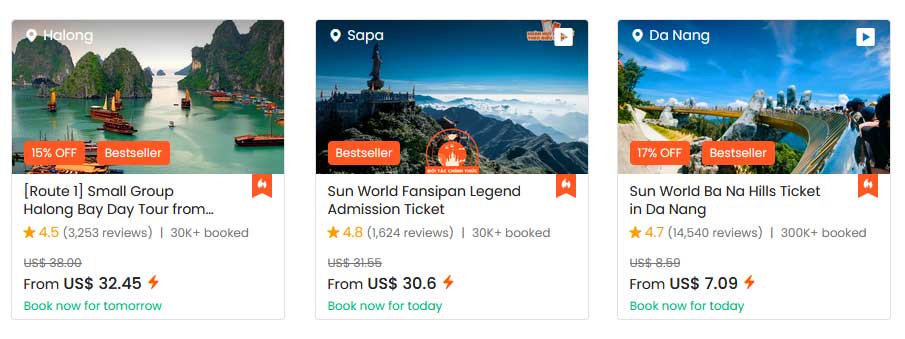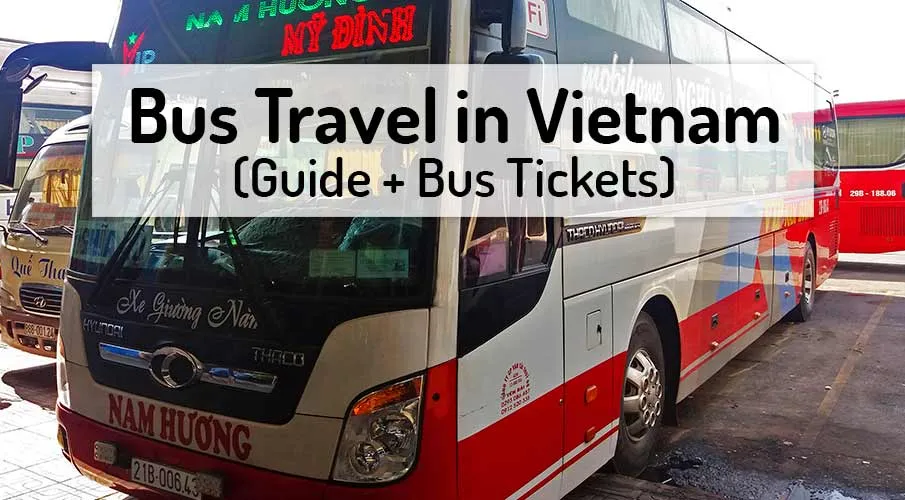
Quick answer: Traveling by bus in Vietnam is both affordable and flexible, connecting major cities, remote villages and border crossings. You’ll find everything from standard coaches and sleeper vans to VIP services—with plenty of booking options online or at stations. It’s a great way to see the country while keeping costs down.
At a glance:
- 🚌 Network: Extensive system linking urban hubs and rural areas across Vietnam.
- 🎫 Ticketing: Buy online, through apps, at counters or hotels; classes vary from standard to sleeper/VIP.
- 📌 Tips: Book ahead for popular routes, check departure times, pick reputable companies.
- 🌍 International routes: Buses also cross into Laos, Cambodia and China from Vietnam.
Note: Comfort and amenities vary widely—from basic seating to fully-reclining sleeper vans—so choose based on your schedule and rest needs.
Last updated in November 2025
🚍 Bus Travel in Vietnam – Complete Guide:
▶️ 1. Introduction to Bus Travel in Vietnam:
Embarking on a journey across Vietnam unveils a mosaic of stunning landscapes, dynamic cities, and immersive cultural encounters. At the heart of this adventure lies an extensive network of buses that traverse the nation’s diverse terrain. From the bustling streets of Hanoi to the serene shores of Nha Trang, buses act as vital connectors, linking bustling urban hubs, remote villages, and popular tourist destinations.
Exploring Vietnam’s Bus Network
-
- Vietnam boasts a sophisticated bus network, intricately weaving its way throughout the country. Major cities like Hanoi, Ho Chi Minh City, Da Nang, and Hue are serviced by efficient urban bus systems, providing convenient transportation options for both locals and visitors. These systems typically consist of a fleet of buses operating along designated routes, with stops strategically located at landmarks, residential areas, and transportation hubs.
-
- In addition, intercity bus services seamlessly link major cities with smaller towns and rural regions, facilitating travel across extensive distances. These buses come in various classes, catering to diverse preferences and budgets, ranging from standard coaches to luxurious sleeper options. With a robust infrastructure and a multitude of operators, Vietnam’s bus network offers flexibility and convenience to travelers exploring the country’s myriad attractions.
The Significance of Bus Travel for Tourists
-
- For tourists, bus travel in Vietnam presents an authentic and immersive mode of experiencing the country’s essence. Unlike other transportation modes such as flights or trains, buses offer an opportunity for travelers to engage with local communities, observe daily life, and uncover hidden gems off the beaten path. Whether winding through the terraced landscapes of Sapa or navigating the coastal routes of Phan Thiet, bus journeys provide a unique glimpse into the soul of Vietnam.
-
- Furthermore, bus travel remains an economical choice for travelers seeking to maximize their exploration while adhering to a budget. With affordable fares and an extensive route network, buses enable access to remote destinations and lesser-known attractions without compromising financial constraints. Whether embarking on a day trip to nearby villages or embarking on an extended adventure across the country, buses offer a cost-effective and efficient means of transportation for travelers of all budgets.
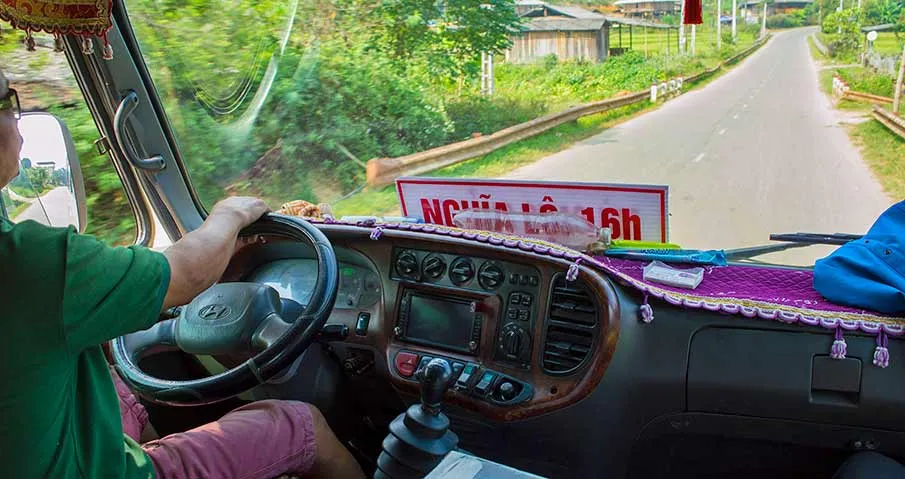
▶️ 2. Deciphering Vietnam’s Bus Network:
Vietnam’s intricate system of buses serves as the backbone of its transportation infrastructure, seamlessly linking vibrant urban hubs with remote rural hamlets. Understanding the intricacies of this network is crucial for travelers eager to uncover the country’s diverse landscapes and cultural gems.
A. Urban Bus Systems
-
- Major Cities and Their Bus Networks: Vietnam’s major cities, such as Hanoi, Ho Chi Minh City, Da Nang, and Hue, boast robust urban bus systems. For instance, in Hanoi, the Hanoi Transport Corporation operates a comprehensive network of bus routes that traverse the city’s bustling streets and historic sites. Similarly, Ho Chi Minh City’s Bus Rapid Transit (BRT) system efficiently connects major districts and suburban areas along key corridors.
-
- Frequency, Routes, and Fare Structures: Urban buses in Vietnam typically run at regular intervals, with frequency varying based on the route and time of day. Routes are meticulously designed to serve residential neighborhoods, commercial centers, educational institutions, and tourist attractions. Fares are usually distance-based or fixed-rate, with tickets available for purchase from bus drivers or designated ticket counters. Recent years have seen the introduction of cashless payment methods, such as prepaid cards and mobile apps, enhancing convenience for commuters.
B. Inter-City Bus Services
-
- Popular Routes and Destinations: Inter-city buses link major urban centers with sought-after tourist spots, scenic vistas, and cultural landmarks across Vietnam. Routes between Hanoi and destinations like Ha Long Bay, Sapa, and Ninh Binh are particularly popular among travelers seeking to explore the country’s natural wonders and cultural heritage. Similarly, routes from Ho Chi Minh City to places like Can Tho in the Mekong Delta, Dalat, Mui Ne, and Vung Tau offer convenient access to diverse landscapes and attractions.
-
- Types of Intercity Buses: Vietnam’s intercity bus fleet comprises a variety of vehicles tailored to different traveler needs. Sleeper buses, featuring reclining seats or bunk beds, are ideal for overnight journeys, allowing passengers to rest comfortably during long trips. Express buses offer quicker travel times and fewer stops, catering to passengers with tight schedules. Additionally, luxury coaches equipped with modern amenities like air conditioning, onboard entertainment, and Wi-Fi are available on select routes for added comfort.
-
- Ticketing Options and Booking Methods: Ticketing options for intercity buses in Vietnam vary by operator and route. Passengers can purchase tickets in advance through online booking platforms, third-party agents, or directly from bus terminals and ticket counters. Booking methods may also include phone reservations or hotel concierge services, offering flexibility for travelers. Some operators even offer e-ticketing options, allowing passengers to present electronic tickets on their smartphones for hassle-free boarding.
Understanding the nuances of Vietnam’s bus network empowers travelers to navigate the country with ease and efficiency, unveiling a plethora of experiences and adventures waiting to be embraced. Whether exploring the lively streets of urban centers or embarking on scenic journeys through rural landscapes, buses serve as gateways to Vietnam’s heart and soul.
⭐⭐⭐ Search and book bus tickets for various tourist buses or private minivans in Vietnam easily online on Baolau ➜ or 12go.asia ➜ ⭐⭐⭐


▶️ 3. Bus Ticketing in Vietnam:
Bus ticketing is a vital aspect of ensuring smooth travel experiences for both locals and tourists in Vietnam. Mastering the process of acquiring tickets and understanding the diverse options available is essential for navigating the country’s rich landscapes and cultural wonders.
A. Ticket Purchase Methods
-
- Ticket Counters: Traditional ticket counters at bus terminals and stations remain a popular choice for purchasing bus tickets in Vietnam. Staffed by knowledgeable personnel, these counters offer travelers the chance to inquire about routes, schedules, and fares before making their purchase. Payment at ticket counters typically involves cash transactions, although some larger terminals may accept credit or debit cards.
-
- Online Booking Platforms: The rise of technology has transformed ticket purchasing through various online platforms in Vietnam. A plethora of websites and mobile apps provide convenient options for browsing routes, checking availability, and securing tickets from anywhere. Real-time updates on seat availability, departure times, and pricing make planning journeys a breeze. Payment options usually include credit/debit cards, electronic transfers, and mobile payments.
-
- Third-Party Agents and Hotel Services: For added convenience, travelers can purchase bus tickets through third-party agents or hotel concierge services. These intermediaries offer personalized assistance in selecting routes, arranging tickets, and managing transportation logistics. While this may involve a service fee, it streamlines ticketing for travelers who prefer professional assistance.
B. Types of Bus Tickets
-
- One-Way vs. Round-Trip Tickets: Travelers in Vietnam can choose between one-way and round-trip ticket options based on their preferences and itineraries. One-way tickets suit those with flexible schedules or single-direction journeys, while round-trip tickets provide pre-booked return travel, eliminating the need for last-minute purchases.
-
- Class Options (e.g., Standard, VIP, Sleeper): Vietnam’s bus operators offer various class options to accommodate different passenger needs and budgets. Standard class buses provide basic amenities and comfortable seating for short to medium distances. VIP class buses offer enhanced comfort with features like reclining seats and entertainment systems. Sleeper buses, with bunk beds or fully-reclining seats, are ideal for overnight travel.
-
- Flexible vs. Fixed Departure Times: Travelers can opt for flexible or fixed departure times based on their plans and schedules. Flexible tickets allow boarding any available bus within a specified timeframe, offering freedom in adjusting plans. Fixed departure tickets are for specific buses at designated times, ensuring adherence to a set itinerary.
⭐⭐⭐ Search and book bus tickets for various tourist buses or private minivans in Vietnam easily online on Baolau ➜ or 12go.asia ➜ ⭐⭐⭐
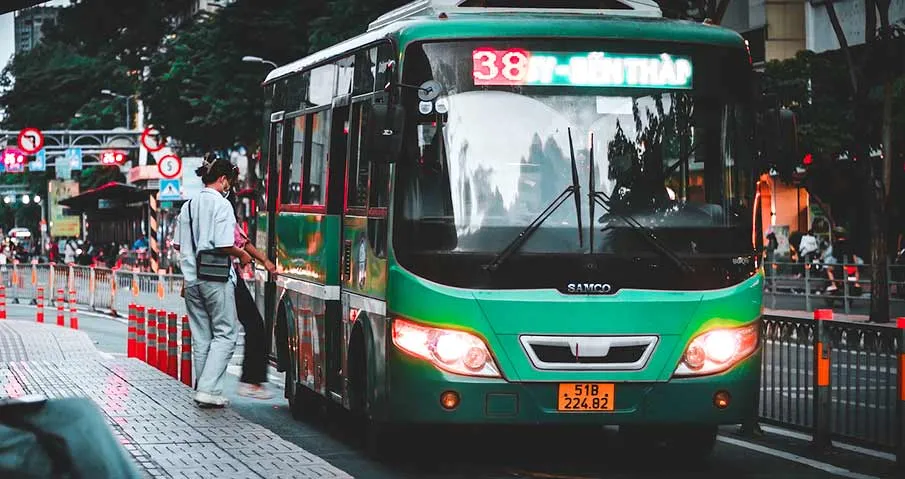
▶️ 4. Tips for Booking and Riding Buses in Vietnam:
To ensure a seamless and enjoyable journey, it’s crucial to acquaint yourself with some essential guidelines for booking and riding buses in Vietnam.
Planning and Reserving Ahead
-
- Securing bus tickets in Vietnam demands foresight, especially during peak travel periods or for popular routes. Advance booking enables travelers to secure preferred seats, dodge last-minute price hikes, and ensure availability, particularly for long-haul trips. Leveraging online booking platforms or seeking assistance from third-party agents can streamline the reservation process, enhancing convenience.
Understanding Bus Timetables
-
- Acquainting oneself with bus schedules and timetables is indispensable for effective trip planning and time management. While urban bus services in major cities often operate on regular intervals throughout the day, intercity buses may adhere to fixed departure times. Checking bus schedules beforehand empowers travelers to orchestrate their itineraries meticulously, ensuring punctuality at desired destinations.
Safety Measures and Comfort Priorities
-
- Safety and comfort take precedence when embarking on bus journeys in Vietnam. Opting for reputable bus operators renowned for their safety and reliability is paramount. Before boarding, conduct a visual inspection of the bus to ensure functional seat belts, intact windows, and clearly marked emergency exits. Dress comfortably and equip yourself with essentials like water, snacks, and medication to stay refreshed and comfortable throughout the trip.
Navigating Language Barriers
-
- Confronting language barriers can pose a challenge when communicating with bus personnel or fellow passengers who may not be fluent in English. Consider acquiring basic Vietnamese phrases or rely on translation apps to facilitate communication and convey essential information effectively. Carrying written instructions or destination names in Vietnamese can minimize misunderstandings, fostering smooth interactions with locals.
Managing Luggage and Personal Items
-
- Efficient luggage handling is key, especially on crowded bus routes or during peak travel times. Pack lightly and opt for compact luggage to alleviate space constraints and facilitate hassle-free storage onboard. Safeguard valuables and personal belongings in a carry-on bag or backpack, ensuring they remain within sight at all times to thwart theft or misplacement.
Observing Etiquette and Cultural Practices
-
- Respecting local customs and cultural norms is imperative while riding buses in Vietnam. Exercise patience and courtesy during boarding and disembarking, prioritizing the elderly and individuals with disabilities. Refrain from engaging in loud conversations, disruptive behavior, or playing music without headphones to uphold a tranquil and respectful ambiance for fellow passengers. Additionally, adhere to Vietnamese customs by removing shoes before entering sleeper buses or seating areas, fostering cultural sensitivity and harmony.

▶️ 5. Other Useful Information for Tourists:
Preparing for your journey across Vietnam involves more than just arranging bus travel. Here’s a comprehensive guide to equip you with valuable information beyond buses alone, ensuring a memorable and hassle-free exploration of Vietnam’s wonders.
Exploring Alternative Transportation Options
-
- While buses offer convenience and affordability, alternative modes of transportation cater to different preferences and travel needs. Trains provide a comfortable and scenic journey between major cities, offering sleeper cabins for overnight travel. Taxis and ride-hailing services are readily available in urban areas, providing door-to-door convenience for city exploration.
Choosing Accommodation near Bus Stations
-
- Proximity to accommodation is key for travelers arriving or departing from bus stations. Many hotels, hostels, and guesthouses strategically line the vicinity of bus terminals, offering convenient access for weary travelers. Booking accommodations in advance ensures availability, facilitating seamless transitions between transportation hubs and lodging.
Sustaining Energy during Long Journeys
-
- Extended bus journeys across Vietnam’s diverse landscapes may require sustenance to maintain energy levels. Pack a selection of snacks, water, and fruits for nibbling during the journey. Alternatively, indulge in local delicacies from vendors at rest stops along the way, embracing the opportunity to sample regional specialties and flavors unique to each destination.
Exploring Attractions Along Bus Routes
-
- Bus journeys offer more than just transportation, they provide opportunities to explore attractions and landmarks along the way. Research points of interest and historical sites near bus routes, planning stops to immerse yourself in Vietnam’s rich cultural heritage. Whether visiting ancient temples, lush national parks, or charming villages, bus travel serves as a convenient gateway to discovering Vietnam’s hidden gems.
Emergency Preparedness and Support Services
-
- Having access to emergency contacts and support services is crucial while traveling in Vietnam. Keep a list of essential contacts, including local emergency services, embassy or consulate information, and hotel details. Consider investing in travel insurance to cover medical emergencies, trip interruptions, and lost or stolen belongings, providing peace of mind and assistance when needed.
⭐⭐⭐ Search and book bus tickets for various tourist buses or private minivans in Vietnam easily online on Baolau ➜ or 12go.asia ➜ ⭐⭐⭐
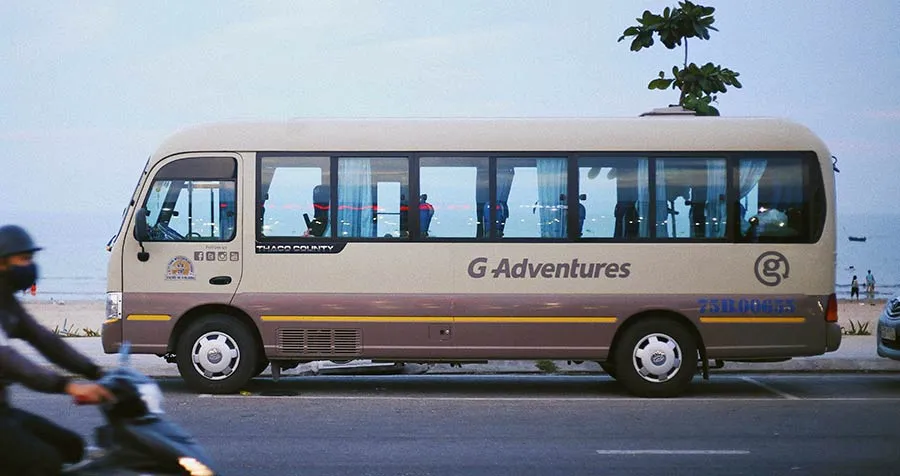
▶️ 6. Private Minibuses or Minivans in Vietnam:
Traveling through Vietnam via private minibuses or minivans offers adventurers a convenient, adaptable, and comfortable means to uncover the country’s diverse landscapes, cultural marvels, and hidden gems. Providing access to remote locales, personalized experiences, and budget-friendly solutions for groups, private transportation significantly enriches the overall journey, crafting enduring memories for explorers traversing Vietnam’s dynamic routes and scenic destinations.
Convenience and Adaptability
-
- Private minibuses or minivans empower travelers with the freedom to mold their itineraries according to personal preferences and schedules. Unlike public buses confined to fixed routes and schedules, private options grant flexibility to depart at times convenient to passengers, making them ideal for those seeking tailored travel experiences.
Access to Remote Areas
-
- A primary advantage of private minibuses or minivans lies in their ability to reach remote locales and destinations inaccessible by other modes of transport. Whether venturing into Sapa’s verdant highlands, discovering Phu Quoc’s pristine beaches, or unearthing hidden villages in the Mekong Delta, private vehicles provide an efficient means for travelers to immerse themselves in Vietnam’s natural wonders and cultural heritage.
Comfort and Privacy
-
- Traveling via private minibus or minivan offers a level of comfort and privacy often absent in crowded public transport. With ample seating and air-conditioned interiors, passengers can unwind and relish the journey, whether embarking on brief day trips or extensive cross-country excursions. Additionally, private vehicles facilitate intimate bonding opportunities among friends or family, elevating the travel experience.
Tailored Tours and Expeditions
-
- Private minibuses or minivans are frequently employed for tailored tours and expeditions tailored to travelers‘ specific interests and preferences. From culinary jaunts and cultural immersions to adrenaline-pumping adventures and wildlife encounters, private tours provide a bespoke approach to discovering Vietnam’s myriad attractions. Accompanied by knowledgeable guides, passengers gain valuable insights into local culture, history, and traditions, enriching their exploration.
Cost-Effective Group Travel
-
- For groups, private minibuses or minivans present a cost-effective alternative to renting multiple vehicles or booking individual seats on public transport. By consolidating resources and sharing expenses, travelers relish the convenience and flexibility of private transportation while minimizing expenditure. This makes private options particularly appealing to families, friends, or tour groups embarking on joint expeditions across Vietnam.
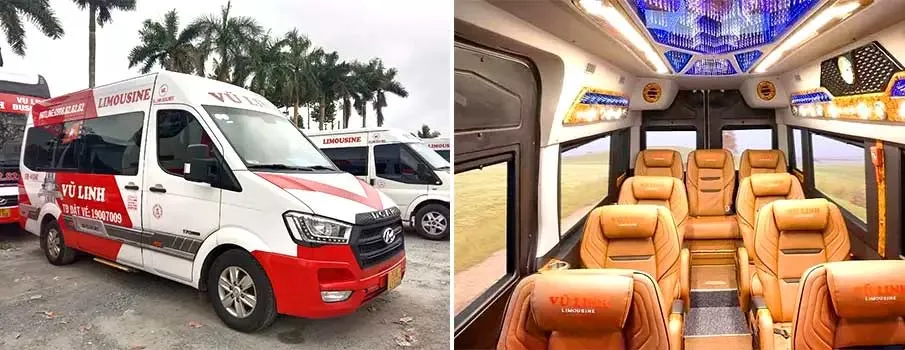
▶️ 7. International Bus Travel from Vietnam to Laos, Cambodia, China:
For travelers seeking to explore neighboring countries, international bus routes offer a convenient and adventurous way to cross borders and discover new horizons. In this article, we delve into the world of international bus travel from Vietnam to Laos, Cambodia, and China, exploring the routes, experiences, and adventures awaiting intrepid explorers.
Vietnam to Laos:
-
- Nestled along Vietnam’s western border, Laos beckons with its serene landscapes and rich cultural heritage. Several international bus routes connect Vietnam to key destinations in Laos, including the capital city of Vientiane and the historic town of Luang Prabang. Travelers can embark on scenic journeys through mountainous terrain, passing by quaint villages and verdant rice paddies along the way. Border crossings are relatively straightforward, with buses typically stopping at immigration checkpoints for visa processing. Once in Laos, travelers can immerse themselves in the country’s laid-back atmosphere, explore ancient temples, and experience the warmth of Laotian hospitality.
Vietnam to Cambodia:
-
- To the southwest of Vietnam lies Cambodia, home to the magnificent Angkor Wat temple complex and the bustling capital city of Phnom Penh. International bus services offer connections from Vietnam to various destinations in Cambodia, providing travelers with an opportunity to explore the country’s rich history and cultural heritage. The journey from Vietnam to Cambodia often traverses flat plains and lush countryside, offering glimpses of rural life along the Mekong River. Upon reaching Cambodia, travelers can marvel at the awe-inspiring temples of Angkor, delve into the country’s tumultuous past at the Killing Fields, or simply unwind on the pristine beaches of Sihanoukville.
Vietnam to China:
-
- Venturing northward, international bus routes from Vietnam extend into the vast expanse of China, offering access to iconic landmarks such as the Great Wall and the bustling metropolis of Beijing. The journey from Vietnam to China is an epic adventure, spanning diverse landscapes from lush tropical forests to rugged mountain ranges. Travelers can expect long-haul bus rides with occasional stops for rest and refreshments. Border crossings between Vietnam and China require adherence to immigration procedures, including visa formalities and customs inspections. Once in China, travelers can explore ancient cultural sites, savor authentic cuisine, and marvel at the country’s modern marvels.
Conclusion:
-
- International bus travel from Vietnam to Laos, Cambodia, and China opens up a world of exploration and discovery for adventurous travelers. Whether traversing the serene landscapes of Laos, delving into Cambodia’s rich history, or immersing oneself in the vibrant culture of China, each journey promises unforgettable experiences and new perspectives. With convenient bus connections, border crossings, and a spirit of adventure, exploring beyond Vietnam’s borders has never been more accessible or enticing.
⭐⭐⭐ Search and book bus tickets for international buses in Vietnam easily online on Baolau ➜ or 12go.asia ➜ ⭐⭐⭐

❓ FAQ + Useful Tips – Bus Travel in Vietnam:
1. How reliable are buses in Vietnam?
-
- Buses in Vietnam are generally reliable, especially for well-traveled routes between major cities. However, occasional delays can occur due to various factors such as heavy traffic, road conditions, or weather. It’s advisable to plan your journey with some flexibility to accommodate any unforeseen delays.
2. Are buses safe for travelers in Vietnam?
-
- Yes, buses in Vietnam are considered safe for travelers. Reputable bus companies prioritize safety by maintaining their vehicles, ensuring drivers adhere to traffic regulations, and providing safety features such as seat belts when available. While accidents can happen, they are rare, and exercising caution while boarding and disembarking can further enhance safety.
3. What types of buses are available in Vietnam?
-
- Vietnam offers a diverse range of buses to cater to different travel needs. Standard buses are commonly used for short to medium-distance journeys and usually feature basic amenities such as comfortable seating and air conditioning. Sleeper buses are ideal for overnight travel, equipped with reclining seats or bunk beds to provide passengers with a restful journey.
4. How do I book bus tickets in Vietnam?
-
- Booking bus tickets in Vietnam can be done through various channels, including online platforms, travel agencies, or directly at bus terminals. Online booking platforms offer convenience and flexibility, allowing travelers to browse routes, compare prices, and reserve seats in advance. Alternatively, tickets can be purchased in person at bus terminals, although availability may be limited, especially during peak travel seasons.
5. What should I consider when choosing a bus company in Vietnam?
-
- When selecting a bus company, consider factors such as safety record, reliability, customer reviews, and the quality of amenities offered. Reputable companies prioritize passenger safety, maintain their vehicles regularly, and employ experienced drivers. Reading reviews and seeking recommendations from fellow travelers can help you make an informed decision.
6. How far in advance should I book bus tickets in Vietnam?
-
- It’s advisable to book bus tickets in advance, especially for popular routes or during peak travel seasons. Aim to book tickets a few days to a week ahead of your intended travel date to secure your seats and avoid the risk of tickets selling out, particularly for long-distance journeys.
7. What amenities can I expect on Vietnamese buses?
-
- Amenities on Vietnamese buses vary depending on the type of bus and the bus company. Standard buses typically offer comfortable seating and air conditioning, while higher-tier buses may provide additional amenities such as onboard restrooms, Wi-Fi, and entertainment systems. It’s essential to check the amenities offered by each bus company before booking your ticket.
8. Are there any overnight bus options in Vietnam?
-
- Yes, overnight bus options are available for travelers in Vietnam, particularly for long-distance journeys. Sleeper buses are equipped with bunk beds or fully-reclining seats, allowing passengers to rest comfortably during overnight travel and arrive at their destination refreshed the next morning.
9. How do I know which bus to take for my destination in Vietnam?
-
- Researching bus routes and schedules in advance is key to determining which bus to take for your destination. Online travel platforms and bus company websites provide route maps, schedules, and ticket booking options, allowing you to plan your journey efficiently and select the most suitable bus for your travel needs.
10. Can I bring luggage on Vietnamese buses?
-
- Yes, passengers are generally allowed to bring luggage on Vietnamese buses, although there may be restrictions on the size and quantity of luggage. It’s recommended to pack light and avoid oversized bags to ensure smooth boarding and storage onboard. Be sure to inquire about luggage policies when booking your ticket.
11. What is the cost of bus travel in Vietnam?
-
- The cost of bus travel in Vietnam varies depending on factors such as the distance traveled, the type of bus, and the bus company. Generally, bus fares are affordable and cost-effective compared to other modes of transportation. Standard buses are typically cheaper than higher-tier buses, while sleeper buses may be slightly more expensive due to the added comfort and amenities provided.
12. Are there any discounts available for bus tickets in Vietnam?
-
- Some bus companies in Vietnam offer discounts for certain groups such as children, students, seniors, or for group bookings. Additionally, booking tickets in advance or purchasing round-trip tickets may qualify for discounted fares. Be sure to inquire about any available discounts when booking your ticket to take advantage of potential savings.
13. Is it necessary to tip bus drivers or staff in Vietnam?
-
- Tipping bus drivers or staff is not a common practice in Vietnam. However, if you receive exceptional service or assistance during your journey, a small tip as a gesture of appreciation is always welcome. Tipping is discretionary and not obligatory, so feel free to tip only if you feel it is warranted.
14. What should I do if I encounter any issues or delays during my bus trip in Vietnam?
-
- If you encounter any issues or delays during your bus journey, remain calm and communicate with the bus staff or driver. They may be able to provide assistance or alternative solutions to resolve the situation. If necessary, contact the bus company’s customer service hotline for further assistance or to report any concerns.
15. Are there any cultural customs when riding buses in Vietnam?
-
- While riding buses in Vietnam, it’s essential to observe basic etiquette and respect local customs. Avoid loud conversations, keep personal belongings secure, and offer your seat to elderly or disabled passengers if needed. Additionally, it’s customary to remove your shoes before entering sleeper buses as a sign of respect for the vehicle and its passengers.
BOOK A PRIVATE TOUR in Vietnam ➜
